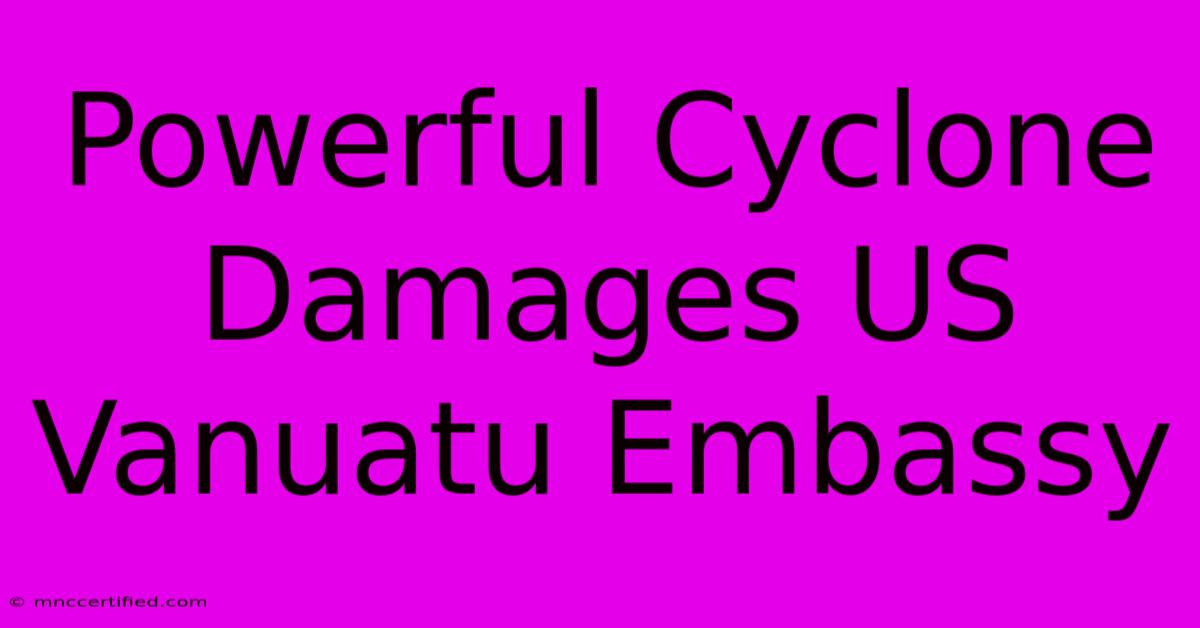Powerful Cyclone Damages US Vanuatu Embassy

Table of Contents
Powerful Cyclone Damages US Embassy in Vanuatu: A Detailed Report
A powerful cyclone recently tore through Vanuatu, leaving a trail of destruction in its wake. Among the significant casualties is the US Embassy in Port Vila, which sustained considerable damage. This article delves into the details of the cyclone's impact on the embassy and the broader implications for US diplomatic operations in the region.
The Cyclone's Fury: Unprecedented Destruction in Vanuatu
Vanuatu, an island nation in the South Pacific, is frequently exposed to tropical cyclones. However, the recent cyclone, [insert cyclone name here], proved exceptionally destructive. High-velocity winds, torrential rainfall, and storm surges caused widespread devastation across the archipelago. The cyclone's intensity and unpredictable path led to significant infrastructure damage, affecting homes, businesses, and critical government facilities, including the US Embassy.
Extent of the Damage at the US Embassy
Initial reports suggest that the US Embassy in Port Vila suffered significant structural damage. While the full extent of the damage is still being assessed, early accounts indicate [mention specific damage, e.g., roof damage, broken windows, flooding]. Images and videos circulating online showcase the severity of the situation, highlighting the impact of the powerful winds and heavy rains. The embassy's operational capacity has undoubtedly been affected, impacting its ability to provide consular services and diplomatic support.
Impact on US Diplomatic Operations and Aid Efforts
The damage to the US Embassy significantly impacts US diplomatic efforts in Vanuatu. The disruption of operations could hinder the delivery of essential services to American citizens in the region. Furthermore, the cyclone's aftermath necessitates a robust humanitarian response, and the damaged embassy may affect the coordination of US aid efforts. The US government is likely to allocate resources towards the reconstruction and repair of the embassy, as well as providing aid to the Vanuatu government and its people.
Humanitarian Assistance and Recovery Efforts
The US, along with other international organizations and nations, is actively involved in providing humanitarian assistance to Vanuatu. This includes delivering essential supplies like food, water, medical aid, and temporary shelter. The US Agency for International Development (USAID) is playing a pivotal role in coordinating these efforts, working closely with local authorities and NGOs. The reconstruction of damaged infrastructure, including the US Embassy, will likely be a long-term project requiring substantial investment.
Long-Term Implications and Reconstruction
The long-term implications of the cyclone extend beyond immediate relief efforts. The rebuilding of the US Embassy will require significant planning and resources. The event highlights the vulnerability of island nations to climate change and the need for strengthened infrastructure to withstand increasingly frequent and intense extreme weather events. It also underscores the importance of international cooperation in disaster response and recovery.
Strengthening Resilience Against Future Cyclones
The destruction caused by [insert cyclone name here] serves as a stark reminder of the need for increased resilience against future cyclones. This includes investing in stronger building codes, early warning systems, and disaster preparedness programs. International collaboration is crucial in sharing best practices and providing support to vulnerable nations in building their capacity to cope with the impacts of climate change.
Keywords: Vanuatu Cyclone, US Embassy, Cyclone Damage, Vanuatu, Port Vila, US Aid, Humanitarian Aid, Disaster Relief, Climate Change, Pacific Islands, Tropical Cyclone, Embassy Damage, Reconstruction, USAID.
Note: Remember to replace "[insert cyclone name here]" with the actual name of the cyclone. You should also fact-check all information and cite credible sources for accuracy and to boost your article's authority and credibility (which is crucial for off-page SEO). Including links to reputable news sources and official government websites would further strengthen the article's SEO and trustworthiness.

Thank you for visiting our website wich cover about Powerful Cyclone Damages US Vanuatu Embassy. We hope the information provided has been useful to you. Feel free to contact us if you have any questions or need further assistance. See you next time and dont miss to bookmark.
Featured Posts
-
Bbcs Helen Rollason A Tribute
Dec 18, 2024
-
Tom Hardy 317k Crew Rescue
Dec 18, 2024
-
Mc Kennies Cagliari Challenge Juve Injuries
Dec 18, 2024
-
Vanuatu Rescue Mission Earthquake Aftermath
Dec 18, 2024
-
Athletic Coach From Wigan Wins National Award
Dec 18, 2024